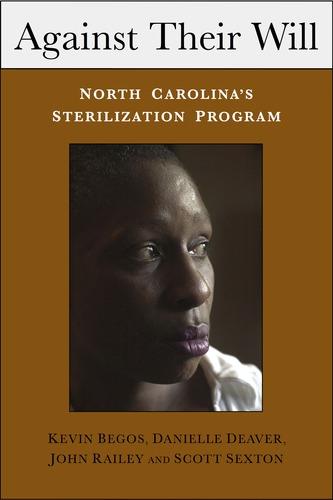| Kevin Begos, Daniel Deaver, John Railey & Scott Sexton, Against Their Will: North Carolina's Sterilization Program & the Campaign for Reparations (Gray Oak, 2012) In the early to mid-20th century, the science of eugenics was born. Called by that name, we all recognize it as something sinister, embodying the rhetoric of Nazi Germany as a justification for eliminating "mongrel" races, less than perfect human specimens. What many people don't realize is how strong a foothold these ideas had in America.
The facts speak for themselves: in North Carolina, more than 7,600 people were sterilized from 1929 to 1974, which put in play one of the America's most aggressive eugenics programs. A state Eugenics Board was formed to "purify" the population by preventing future generations of mentally ill, diseased or "feeble-minded" citizens. This book is a compilation of articles with many stark case histories that range from horrible and hateful to pitiful and agonizing. One woman reported later, "What they did to me was wrong ... it was really, really wrong." Some of those who supported the sterilization initiative recall observing crushing poverty and feeling that they were helping its victims, but at its heart, the movement was motivated by an innate sense of intellectual, economic and racial superiority on the part of those with the power to give the sterilization order. One girl's mother pleaded on behalf of her child, but the state refused to release the girl from a juvenile facility at age 17 without getting sterilized, claiming that she was feeble-minded, though she had not been so classified when she entered the institution. One victim was only 10 years old. It has taken about 10 years since the articles first appeared to create sufficient awareness and make inroads to getting victim compensation. Legislation was passed this year to offer reparations to those still living who were involuntarily sterilized. They will be compensated at the rate of $50,000 each; and the state has officially apologized. However, as late as June 2012, the compensations had been approved but had still not materialized, with the legislature pleading lack of funds in the tough political and economic climate. It's a sad and shameful piece of the state's history that may fade with time as the victims are, we hope, compensated justly, but there is an underlying factor that is still being examined: the role played in that era by major contributions to North Carolina's most honored institutions -- Wake Forest Baptist Hospital, Wake Forest University and their adjuncts -- from eugenic/racist organizations such as the Human Betterment League, formed by some of Winston Salem's most prominent citizens. 
|
 Rambles.NET book review by Barbara Bamberger Scott 1 September 2012 Agree? Disagree? Send us your opinions!  



 |

